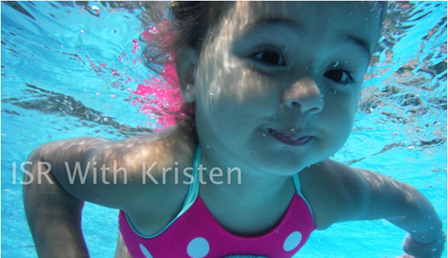I hear you say your priority is survival skills.
Will my child learn to actually swim?
Yes. At ISR, we believe that part of survival for a child who can walk is swimming. Children learn the swim-float-swim sequence so that they could get themselves to safety. The difference in our program is that they will learn swimming AND survival skills and how to be an aquatic problem solver.
Will my child need additional lessons?
Based on our research, we know that refresher lessons are important because
children change so much both cognitively and physically during the first 4-5
years of life. It is important that their water survival skills grow with
them.
Frequency depends on the child's age, growth rate, skill level and confidence level. The goal of refresher lessons is to help your child adjust his/her new body size and weight to his/her existing skill level. Your instructor will work with your child to help fine-tune his/her aquatic experience which will result in self-confidence. This is especially important if your child has not been able to practice any appropriate aquatic skill between seasons.
What is the retention rate with ISR lessons?
ISR claims a retention rate of 94-100% up to one year following lessons. Having said this, children will explore and may pick up bad habits watching other children or with interference like floating in a bathtub or playing on the steps. As your child goes through lessons, you will begin to understand, through communication with your Instructor, what activities may interfere with his/her learned Self-Rescue skills. Contacting and/or returning to your instructor in a timely manner is imperative to maintaining effective habits.
Why are lessons 5 days per week and for only 10 minutes?
The reason for this is multifaceted. First, repetition and consistency are crucial elements of learning for young children. Research shows that short, more frequent lessons result in higher retention. Second, most children have fairly short attention spans and will not be able to focus on the task for longer and we want to take advantage of the best time for learning. A third reason is that, though the pool temperature is maintained at 78-88 degrees, the temperature is still lower than your child's body temperature. Lessons are work and therefore will also be loosing body heat. Instructors check students regularly for temperature fatigue since this is an indicator of physical fatigue.
Why does it take 4-6 weeks for my child to learn this?
The 4-6 weeks is an estimate that is based on the average time in which it takes most children to learn these survival skills. Every child is unique and ISR.s Self-Rescue program is specifically designed based on your child.s individual strengths and needs. It is important to realize that this is an average, which means that some children will actually finish more quickly while others will need more practice. ISR is dedicated to safety and, therefore, we want to provide your child with the time and best opportunity to become proficient in his/her survival skills. We will always honor your child.s needs.
How can you teach babies and young children to swim?
ISR instructors teach infants to swim by honoring each child's individual strengths and experiences. They understand the fundamentals of the behavioral sciences, child development and of sensori-motor learning as it relates to the acquisition of aquatic survival skills; they use this education to guide each child through the sequence of learning to swim and float. How do the kids react during the first few lessons? Children often fuss during the first few lessons because they are in a new environment and around new people. As your child becomes more confident in his/her ability in the water, the fussing will decrease. What you will find is the instructor may get some fussing during lessons because the child is in a learning/working environment. However when you swim with your child it is associated with fun/playtime and you will find they rarely want out of the water.

